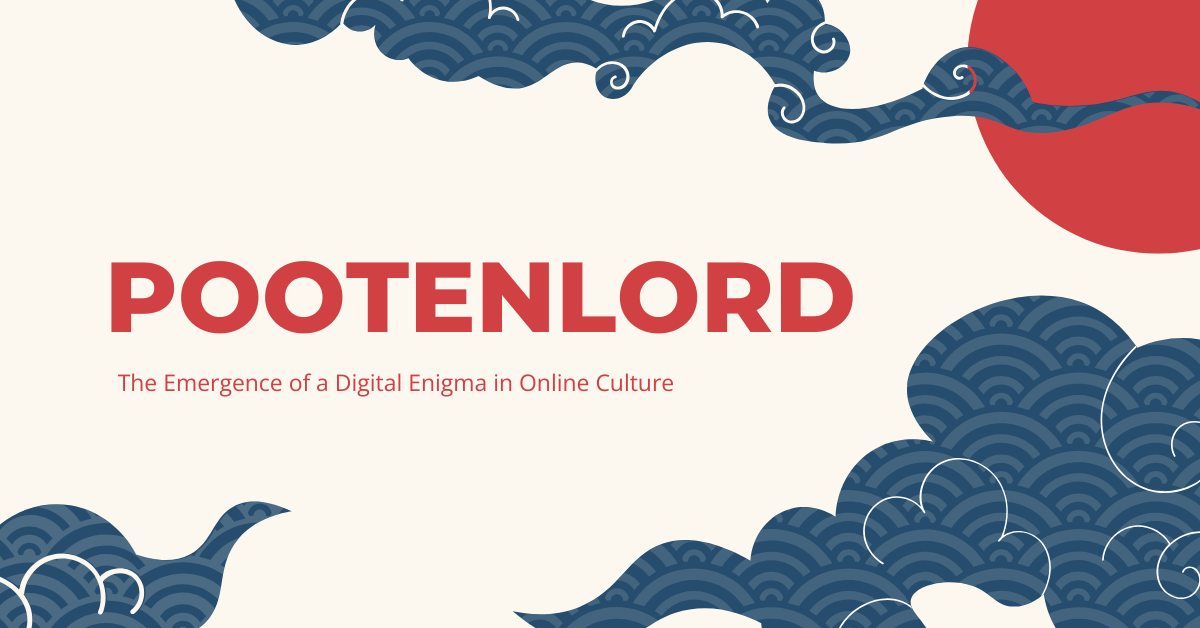In an internet ecosystem teeming with ephemeral content and throwaway usernames, the term Pootenlord surfaces as something both odd and oddly persistent. Whether you’ve seen it as a gamer tag, meme tag, or social handle, the name “Pootenlord” captures attention not for its logic, but for its unmistakable imprint. What exactly is Pooten-lord? A username? A meme? A character? Or is it a manifestation of how identity is crafted and reimagined in the digital age?
This article unpacks the layered meanings, origins, behavioral patterns, and cultural value of Pootenlord, not only as a term but as a phenomenon. It is part satire, part performance, part signal—a digital costume in the masquerade of online culture.
The Birth of Pootenlord: Origin by Design or Accident?
The name “Pootenlord” bears no obvious etymology, and that’s part of its magic. Like many memorable usernames, it likely began as a spontaneous, playful invention. Linguistically, “Pooten” offers nothing familiar—it’s not a surname, not a known place, not even a borrowed word. Combined with “lord,” a term that connotes power or satire in online spaces, the name becomes comically inflated: Pooten-lord. It sounds important, even if its importance is manufactured.
Whether the name was created in a gaming lobby, a comment thread, or a YouTube account, what matters is its deliberate absurdity. It stands out—precisely because it makes no sense.
Why the Internet Loves Names Like Pootenlord
Digital pseudonyms operate under different rules than real-world names. While traditional names carry cultural, ethnic, or familial weight, online aliases are free to be performative, nonsensical, and entirely fluid. In fact, absurdity often equals memorability.
The name Pooten-lord works because:
- It avoids cliches (no “xX_DarkSlayer_Xx” energy)
- It is linguistically unique (Google it—you’ll find the same handful of accounts)
- It balances mock-regality with playful randomness
These traits make it ideal for avatars, meme creators, and digital satirists looking to occupy a space that’s instantly recognizable but deliberately offbeat.
Table: Elements of Effective Digital Usernames
| Feature | Description | Pootenlord’s Example |
|---|---|---|
| Uniqueness | Avoids common structures and patterns | No existing cultural match for “Pooten” |
| Brevity | Easy to type, pronounce, remember | Three syllables, no special characters |
| Tone | Blends humor with irony | “Lord” implies mock-seriousness |
| Ambiguity | Open-ended meaning encourages curiosity | No fixed identity or backstory |
| Visual Consistency | Looks clean in various fonts/contexts | No numbers or underscores |
The Meme Ecosystem and Pootenlord’s Role
In meme communities, particularly on Reddit, Discord, or Twitter, usernames can evolve into mini-brands. A user named Pootenlord posting consistent, funny content becomes part of the fabric of meme culture. The absurdity of the name makes each post feel a bit more surreal—part of a larger fictional universe that users co-create through inside jokes, image macros, and video edits.
In some forums, usernames like Pooten-lord become narrative devices, almost like characters in a decentralized sitcom. “Pootenlord strikes again” or “Classic Pootenlord move” are phrases that emerge not because of who the person is, but because of what the name represents—a kind of lovable chaos.
Behavioral Archetypes: What Does a Pootenlord Post Like?
While Pootenlord is not a specific individual, the name suggests a persona. An archetypal Pooten-lord account might exhibit the following traits:
- Unapologetic humor: Embracing low-brow, slapstick, or surreal comedy
- Subtle trolling: Posting bizarre but technically on-topic replies
- Image saturation: Preferring meme formats with visual punchlines
- Anti-hero vibes: Playing the fool, but always on-brand
This persona allows users to embody characters—anonymous, unfiltered, unbound by conventional behavior—and the name “Pootenlord” becomes shorthand for that digital roleplay.
Evolution Through Platforms
Pootenlord-type usernames flourish on subreddits like r/OkBuddyRetard, r/MemeEconomy, or r/SurrealMemes. These platforms thrive on irony and self-aware nonsense, where a name like Pooten-lord adds to the meta-layer of the joke.
Discord
In private servers, the username is part of the performance. A Pootenlord might run a meme bot, moderate a chaotic channel, or serve as the unpredictable wildcard.
YouTube/TikTok
Short-form content creators often choose names like Pootenlord to signal their irreverent tone. Video intros like “Hey, it’s your boy Pooten-lord” immediately set expectations for absurdity.
Twitter/X
The name might be used as a shitposting identity—spamming surreal one-liners, engaging in deadpan debates, or parodying news trends.
The Power of Digital Identity
Online, your name is your signal. It communicates your tone, intention, and role in the digital theater. Names like Pootenlord signal to the audience: “This isn’t serious, but it’s not random either. Play along.”
This performance is both creative and strategic. Users learn to build:
- Micro-brands: Consistent content themes, tone, and visuals
- Community relationships: Others follow or tag the account for humor or reactions
- Reputation capital: Internet clout via likes, shares, or meme remixes
Pootenlord works because it becomes a container for this creativity—both specific and abstract, disposable yet sticky.
Table: Online Name vs Real-World Identity
| Attribute | Real-World Name | Username (e.g., Pootenlord) |
|---|---|---|
| Permanence | Lifelong, legal | Changeable, disposable |
| Cultural Meaning | Rooted in tradition | Often ironic or fictional |
| Social Weight | Family and legacy | Performance and perception |
| Function | Identification | Signaling tone or role |
| Discovery | Given at birth | Chosen with intention or whim |
Is There a Real Pootenlord?
It’s entirely possible that someone, somewhere, consistently uses the name Pootenlord. In fact, there are likely multiple “real” Pootenlords—on Instagram, Xbox Live, Reddit, and more. But the cultural power of the name isn’t tied to any one user. Instead, Pootenlord functions like a digital archetype, a kind of mythological jester in the virtual agora.
Even if one Pootenlord gains modest internet fame, the name is transferable. Anyone can adopt it, remix it (“P00tenL0rd”, “Lil Pooten”, etc.), or spoof it. This transience is power. The name belongs not to a person, but to a collective imagination.
Parody, Pseudonymity, and Meme Longevity
Names like Pootenlord thrive because the internet rewards:
- Anonymity: Users can act without consequence
- Parody: Satirizing trends, people, or events
- Layered references: Creating inside jokes that evolve with time
Pootenlord functions well within this ecosystem. It’s a vessel for commentary. A tweet from Pootenlord about politics is read differently than one from JohnSmith1992. The former implies irony or sarcasm by default. This interpretive flexibility extends the meme-lifespan of the name.
The Semiotics of the Absurd
Absurd names like Pootenlord serve a cultural function: they undermine digital seriousness. While corporations try to standardize online identity (real names, verified accounts), meme culture thrives on chaos. Pootenlord is an act of resistance. It says:
- “I won’t be categorized.”
- “I’m not here to impress you.”
- “The internet is still weird—and I’m keeping it that way.”
This semiotic protest—via usernames—preserves the playful, human side of online interaction.
Table: Username Archetypes in Internet Culture
| Archetype | Description | Example |
|---|---|---|
| Edgelord | Provocative, often offensive | DoomSlayer666 |
| Innocent Bait | Soft, disarming names | FluffyToast22 |
| Surreal Satirist | Deliberately odd and playful | Pootenlord |
| Literalist | Straightforward, informative | JohnFromChicago |
| Aesthetic Vibes | Trendy, lowercase, soft | lo_fi_wizard |
Future of Digital Naming
As platforms evolve to demand more verification (e.g., LinkedIn, Threads, Meta), the space for chaotic identities like Pootenlord may shrink. Still, there will always be pockets—private servers, indie platforms, fringe communities—where surrealism is welcomed.
In fact, pseudonymous performance may become more intentional. Web3 and decentralized apps often encourage users to build alt-identities, avatars who accumulate their own history, reputation, and meaning.
Pootenlord may just be a forebear to the digital masks we all might wear in virtual spaces of the future.
Summary: Why Pootenlord Matters
You don’t need to know who Pootenlord is to understand why the name matters. In a time when digital identities are carefully managed, monetized, and curated, Pootenlord is a rejection of optimization. It’s pure internet spirit: playful, obscure, human, and a little stupid in the best way.
Names like Pootenlord remind us that the internet is more than algorithms and ads. It’s a place of invention, irreverence, and creative freedom. And sometimes, a name with no meaning becomes a symbol of all the meanings we’re free to assign.
FAQs
1. What is Pootenlord?
Pootenlord is a unique and often absurd digital username that has become symbolic of meme culture, humor, and online anonymity. It represents a type of internet persona rather than a specific individual.
2. Where did the name Pootenlord come from?
The origin of the name is unclear, likely invented spontaneously in an online forum or gaming environment. Its randomness and humor are part of its appeal, not a flaw.
3. Is Pootenlord a real person?
While various users may adopt the name across platforms, Pootenlord is better understood as a persona or archetype than a single individual.
4. Why is Pootenlord popular in meme communities?
Its absurd, ironic tone fits perfectly within meme ecosystems that value surreal humor, parody, and creative identity play. It’s memorable and consistently evokes a laugh.
5. Can anyone use the name Pootenlord?
Yes. Like many internet handles, Pootenlord is not exclusive. Its value lies in how it’s used—creatively, humorously, and often with a layer of self-aware performance.











